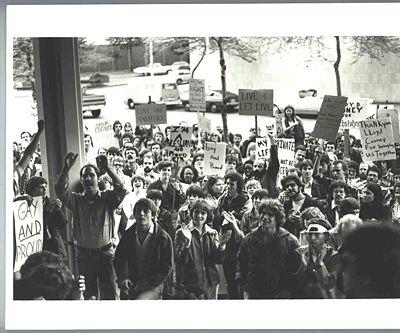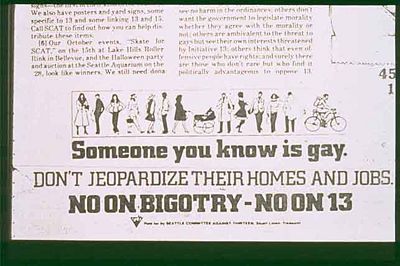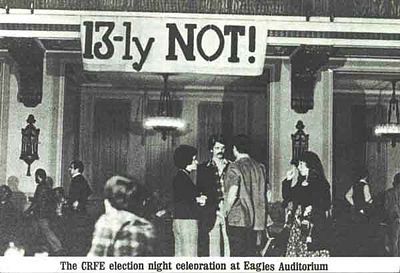Difference between revisions of "1970s Politics"
The NWLGHMP (talk | contribs) |
The NWLGHMP (talk | contribs) |
||
| Line 1: | Line 1: | ||
== 1970s Politics == | == 1970s Politics == | ||
| − | Lesbians and gay men across the country enjoyed unprecedented visibility and political gain in the 1970s. Through the early efforts of | + | Lesbians and gay men across the country enjoyed unprecedented visibility and political gain in the 1970s. Through the early efforts of progressive-minded city council members and activists, Seattle’s gays and lesbians were protected from discrimination in employment by 1973 and housing by 1975. These ordinances had not provoked much controversy when approved by City Council. In the 1970s organizations such as the Dorian Group (a later re-organization of the Dorian Society), Gay Community Social Services, and the Union for Sexual Minorities expanded the scope of gay activism into the wider context of human rights and gender equality. |
Such progress was threatening to many in the larger society, however. In 1977, Anita Bryant's "Save Our Children" campaign overturned gay rights ordinances in Dade County, Florida. Anti-gay forces across the country stepped up efforts to repeal laws preventing discrimination against gays and lesbians. In Seattle, the president of KIRO aired a series of editorials calling for the repeal of the city's gay rights ordinances. | Such progress was threatening to many in the larger society, however. In 1977, Anita Bryant's "Save Our Children" campaign overturned gay rights ordinances in Dade County, Florida. Anti-gay forces across the country stepped up efforts to repeal laws preventing discrimination against gays and lesbians. In Seattle, the president of KIRO aired a series of editorials calling for the repeal of the city's gay rights ordinances. | ||
| Line 17: | Line 17: | ||
[[Seattle, WA: Queen City Comes Out: Exploring Seattle's Lesbian and Gay History]] | [[Seattle, WA: Queen City Comes Out: Exploring Seattle's Lesbian and Gay History]] | ||
<BR><BR> | <BR><BR> | ||
| − | <small>''All content of this page copyrighted by NWLGHMP.''</small> | + | <small>''All content of this page copyrighted by NWLGHMP.''</small> <comments /> |
Revision as of 13:39, 30 April 2010
1970s Politics
Lesbians and gay men across the country enjoyed unprecedented visibility and political gain in the 1970s. Through the early efforts of progressive-minded city council members and activists, Seattle’s gays and lesbians were protected from discrimination in employment by 1973 and housing by 1975. These ordinances had not provoked much controversy when approved by City Council. In the 1970s organizations such as the Dorian Group (a later re-organization of the Dorian Society), Gay Community Social Services, and the Union for Sexual Minorities expanded the scope of gay activism into the wider context of human rights and gender equality.
Such progress was threatening to many in the larger society, however. In 1977, Anita Bryant's "Save Our Children" campaign overturned gay rights ordinances in Dade County, Florida. Anti-gay forces across the country stepped up efforts to repeal laws preventing discrimination against gays and lesbians. In Seattle, the president of KIRO aired a series of editorials calling for the repeal of the city's gay rights ordinances.
In January of 1978, two Seattle police officers, representing the organization Save Our Moral Ethics, filed Initiative 13, which sought to repeal protection for lesbians and gays in housing and employment in Seattle. Seattle's lesbian and gay community was divided over how best to combat the Initiative, splitting into three organizations with very different tactics. Some emphasized the right to privacy, keeping discussion of homosexuality itself to a minimum, while others emphasized acceptance of gays.
Though similar initiatives were successful in other cities, Seattle voters resoundingly rejected Initiative 13, 63% to 37%. The anti-Initiative 13 campaign of 1978 was an important step in the development of a gay political force in Seattle. A common threat had galvanized the gay community, and the flurry of fund raising, leafleting, doorbelling, public speaking and advertising had brought out many people who had never been politically active. Gay men and lesbians had also come together politically in a way they had not before. The impact of the initiatives are recounted in the Initiative 13 - Oral Histories.
Seattle, WA: Queen City Comes Out: Exploring Seattle's Lesbian and Gay History
All content of this page copyrighted by NWLGHMP. <comments />


